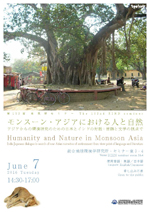The 132nd RIHN seminar
In the era of huge change not only in the field of social but also global environmental level, to investigate new narrative which can give us encouragement to survive in this time of change is an urgent necessity. Monsoon Asia is one of the hot spot of economic development and hence is the focal point of this problem. At the same time, the region has a huge potential to develop alternative way of life and philosophy in the same situation. In order to establish it, it is necessary to make a new platform for discuss the problem in broad view.
Under the circumstances of Monsoon, how has humanity lived? And how can humanity draw a future vision?
The 132nd RIHN seminar invites Dr. Gita A Keeni and Dr. Masayuki Onishi. Lectures will be on the topic of rain in Bengali and Japanese language and literature, hence, reveal the modality of humanity under the Monsoon environment. Also comments from view point of Climatology and study on Indus Civilization will be given.
The dialogues between two different culture both of which have long history and rich tradition will be not only the exchange of the view, but also an occasion to produce a synergy effect, and will lead new view for humanity and nature.
| Date: | June 7th, 2016 (Tuesday) 14:30 - 17:00 |
| Place: | Seminar room 3&4, RIHN( → Access) |
| Title: | India-Japanese dialogue in search of new Asian narrative of environment from view point of language and literature |
| Language: | English/ Japanese |
|---|---|
| Contact: | Masahiro Terada (Visiting Associate Professor, RIHN,  ) ) |
Program
- 14:30 - 14:45 Introduction, Short Video Screening
- 14:45 - 15:15 Lecture1
- 15:15 - 15:45 Lecture2
- 15:45 - 15:55 Pause
- 15:55 - 16:15 Comments
- 16:15 - 17:00 Discussion
“Video Essay on Shantiniketan” Masahiro Terada
“Humanity and Nature from view point of comparison between Bengali and Japanese vocabulary of rain and Monsoon” Gita A Keeni
“Monsoon as seen through Bengali literature: Tagore's monsoon songs and Tarashankar Bandopadhyay's stories” Masayuki Onishi
Tetsuzo Yasunari (From view point of Climatology), Toshiki Osada (From view point of study on Indus Civilization)
- ■Visva Bharati University is an Indian National University, founded by Rabindranath Tagore in Shantiniketan in 1901, and since then has a long tradition of research and education based on profound environmental philosophy of him.
- ■Research Institute for Humanity and Nature (RIHN) is a Japanese national institute, based in Kyoto, which studies on the problem of humanity and nature from an interdisciplinary way.
- ■Gita A Keeni Professor, Head, Japan department, Visva Bharati University. Japanese Studies. Focused on “Nihon Ryoiki.” Has translated Kenji Miyazawa’s work into Bengali.
- ■Masayuki Onishi Visiting researcher, Research Center for Knowledge Science in Cultural Heritage, Doshisha University. Studied in Visva-Bharati Univerisy in 1970s. Translated many literary works of major modern Bengali writers such as Rabindranath Tagore, Mahasweta Devi and Tarashankar Bandyopadhyay into Japanese. Was subleader of RIHN’s FR “Environmental Change and the Indus Civilization” (2007-11) and leader of FS “Bio-cultural Diversity in the Asia-Pacific” (2013-14).
- ■Tetsuzo Yasunari Director General, RIHN. Climatology & Meteorology. Since 1970s, he studied dynamics of Asian monsoon variations through the field research in the Himalaya-Tibet and the theoretical studies at the Indian Institute of Tropical Meteorology.
- ■Toshiki Osada Professor Emeritus, RIHN. Linguistics. Project leader of the “Environmental Change and the Indus Civilization” project undertook in RIHN in 2007-2011. Proved the influence of environmental change on the decline of Indus Civilization.


